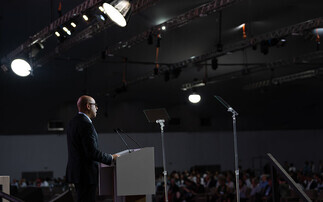French foreign minister Laurent Fabius urges countries which missed the October 1 deadline - including Bolivia, Iran and Saudi Arabia - to submit INDCs as soon as possible
Nearly 50 countries have missed the October 1 deadline to submit their national climate action plans, known as Intended Nationally Determined Contributions (INDCs), ahead of the climate summit in Paris later this year.
French foreign minister Laurent Fabius yesterday urged the remaining straggling countries to submit their INDCs "as soon as possible" ahead of the December summit.
"I invite all countries who have not yet submitted their contribution, notably the large-scale contributors, to do so as soon as possible to contribute to an ambitious and fully successful Paris climate conference," he said in a statement.
To date, 146 countries have submitted INDCs, accounting for 87 per cent of global emissions. All of the world's top 10 emitters have submitted climate action plans, while a host of nations have pledged to deliver steep emissions cuts by 2030 as part of any Paris Agreement.
However, 49 countries are still yet to submit their plans, including Bolivia, Iran, Saudi Arabia, Sudan, Pakistan, Nigeria, Egypt, Venezuela, Malaysia and the United Arab Emirates. Together the 49 missing countries account for around 10 per cent of all global emissions, and include many of the world's major oil producers.
Last week a flurry of INDCs were submitted just ahead of the UN deadline, with pledges from large emitters such as India and the Philippines garnering the most media attention. In its long-anticipated INDC India pledged to cut the emissions intensity of its economy by 33 to 35 per cent by 2030.
The latest wave of INDCs came as energy ministers from G20 countries affirmed their commitment to renewable energy yesterday at a meeting in Turkey. The meeting is the first time renewable energy has been officially on the agenda for a G20 gathering.
Ministers endorsed an 11-point Communiqué backing the accelerated deployment of renewable energy, improvements to energy efficiency, and the phase-out of "inefficient" fossil fuel subsidies.
The Communiqué also backs the adoption of a renewable energy toolkit prepared by the International Renewable Energy Association (IRENA), which is designed to help countries develop tailored policy frameworks for clean energy rollouts, based on strategies that have proven to drive down the cost of clean technology, accelerate the deployment of bioenergy, and raise finance for renewables projects.
General Adnan Amin, director general of IRENA, said G20 countries can accelerate the transition to clean energy through "concerted and co-ordinated action".
"The G20 countries hold 75 per cent of total global deployment potential and 70 per cent of total global investment potential for renewable energy between now and 2030," he said in a statement. "With this tremendous market opportunity before them, concerted and coordinated action undertaken by G20 countries to advance renewable energy can really move the needle on global deployment as we transition to a clean energy future."
The Communiqué will now be presented to G20 leaders at the Antalya summit in November for consideration.
This article is part of BusinessGreen's Road to Paris hub, hosted in association with PwC









